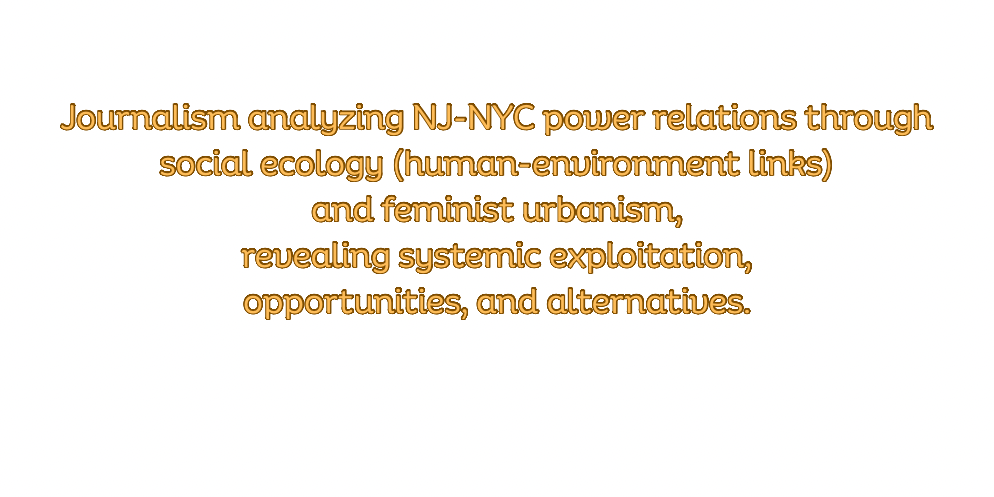
Our ethics

Our privacy policy


Sprawlism is a critical resource for sustainable urban policy in the New York Metro area. Our work is defined by three core functions:
- Critical Analysis: We provide a necessary critical perspective on urban and suburban development, using the frameworks of feminist urbanism and social ecology to highlight inequities and identify climate solutions.
- Education & Translation: We move theory into practice by translating academic critique and analysis into accessible information, empowering both the public and policymakers to make informed decisions.
- Convening & Dialogue: We create a neutral space for constructive debate, bridging divides between factions within the climate movement to find common ground on strategic issues like adaptation versus mitigation.
Sprawlism is a project of Alternative Newsweekly Foundation (ANF) founded by the Association of Alternative Newsmedia (now known as AAN Publishers) in 2002. We are also in partnership with the public Montclair State University’s Center for Cooperative Media, and we are a member of the Tiny News Collective!
Why are we based Newark rather than Manhattan?
First off, we love Newark. It is BEAUTIFUL, secondly, New Jersey is the most urban state in the United States. Every county is designated as urban by the US Census Bureau and it is the most dense state in the United States. We hope that what we discover in New Jersey can be a model for Feminist Urbanism across the US.
What is Feminist Urbanism?
Feminist Urbanism uses a feminist lens to construct and design an intentional community that allows all genders to access the instruments to create the life of their dreams. Feminist urbanism believes that your income should not dictate where you live and your gender should not dictate your income. Feminist urbanism is also about the utility of cooperation and collective efforts, it harnesses people-centric metrics rather than market centric metrics to effectuate new relationships, this would include using methods rooted in LPE, blue green planning, complex & prosocial theories, and demand side economics.
Sprawlism definition of Urbanism
Sprawlism is rooted in the theory of Space is a Means of Production (we are not productivists) is definition for the space that inhabits urbanism—it is borrowed from the French philosopher Henri Lefebvre and his 1968 book Le Droit à la Ville and his Right to the City concept:
“Space is not a scientific object removed from ideology or politics. It has always been political and strategic. There is an ideology of space. Because space, which seems homogeneous, which appears as a whole in its objectivity, in its pure form, such as we determine it, is a social product.”
There is abundance in the collective. We believe that together we can create a citylife that a diversity of people can share.
STAFF:
💋Founder & editor L. Lo Sontag is a feminist urban critic, filmmaker, essayist, and journalist in the “City of New Jersey.” She was the Inaugural Sadie T.M. Alexander Economics Fellow at The New School from 2022/2024 and an Ethic and Equity Fellow from 2021/2022 at the Lincoln Land Policy Institute. She is an alumna of the LA women’s college, Mount St Mary’s University as well as Claremont and The New School she holds an MPA degree with concentrations in urban planning and urban economics. She is the curator of La Ciclovía de Bloomfield Conversations, a series discussing the climate crisis impacts on New Jersey, a stringer with Associated Press supporting their political & economics coverage, and an op-ed & opinion writer for various media including NextCity, Los Angeles Times, NJ.com, and the LA Weekly. She has over 20 years of independent media experience, running the Morningside Park Chronicle, The Bus Bench, and The BrickBat Revue.
💋Kimberly Clark Co-Host Auto Asphyxiation and social media manager a nurse, multidisciplinary artist, and visionary feminist urbanist whose work bridges the realms of public infrastructure, social justice, and cultural innovation. A compelling voice in urban advocacy, she champions the transformative potential of public transit as critical infrastructure, interrogating how mobility systems shape equitable cities, human connectivity, and collective liberation.
With a career spanning clinical care and creative practice, Clark employs a rigorous yet empathetic lens to dissect the interplay between urban design, community agency, and intersectional feminism.
A citizen scholar of both civic systems and galactic mythos, Clark occasionally (often) draws parallels between Star Wars lore and urban governance, reframing complex sociopolitical themes through speculative allegory and strategic levity. This signature approach informs her podcast contributions and social media management, where she renders intricate policy debates into dynamic, accessible dialogues without sacrificing intellectual depth.
Whether analyzing bus rapid transit through the lens of Rebel Alliance tactics or unpacking healthcare disparities via textile art installations or telling you to behave on our public square, Clark’s work remains anchored in a singular mission: to reimagine cities as sites of radical care, creativity, and democratic possibility.


